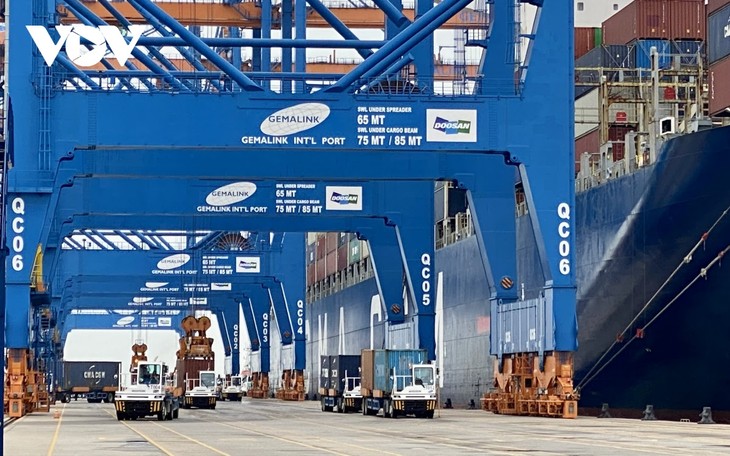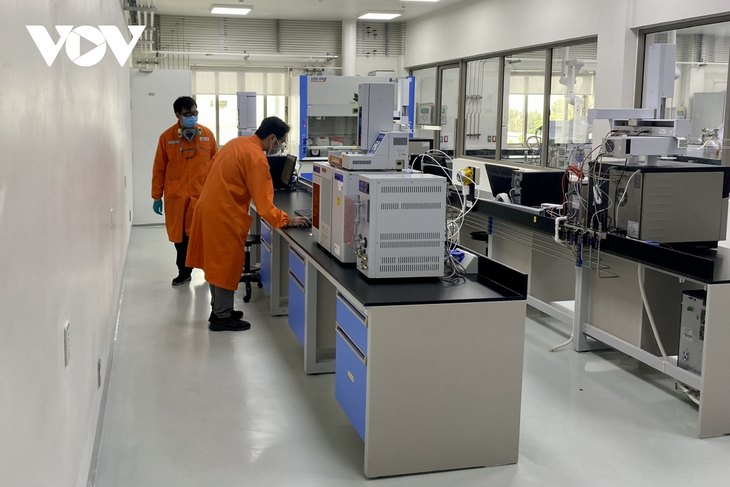(VOVWORLD) - Located in the southern key economic region, Ba Ria-Vung Tau Province has a number of key economic industries – petrochemicals, logistics, electricity, chemicals, and seaports. To meet requirements in economic development and to attract investors, Ba Ria-Vung Tau has attached great importance to improving the quality of its labor resources, especially creating a skilled workforce.
 Ba Ria-Vung Tau needs qualified human resources to become a national marine economic hub. (Photo: Gia Khang) Ba Ria-Vung Tau needs qualified human resources to become a national marine economic hub. (Photo: Gia Khang) |
Ba Ria-Vung Tau Province has more than 575,000 workers employed in businesses and industrial parks. 37% of them are working in the industrial sector, 20.5% in agriculture, and 42.4% in the service industry. The rate of trained workers accounts for 80.8%, while 33.8% of trained workers have certificates.
Tran Quoc Khanh, Director of the provincial Department of Labor, War Invalids and Social Affairs, said that Ba Ria-Vung Tau’s labor productivity is among the highest in Vietnam.
According to Khanh, Ba Ria-Vung Tau’s quality of human resources is high while the percentage of trained workers is high compared to the whole country, thereby meeting the needs of businesses in the area.
“The achievement is attributed to the provincial leaders who have launched a project to increase the rate of workers with certification to 35% by 2025 and 43% by 2030,” said Khanh.
The demand for skilled workers in Ba Ria-Vung Tau is expected to increase, especially for petrochemical, manufacturing, IT, and automation businesses.
In early November, the provincial People’s Council approved a resolution to adjust the provincial planning until 2030, with an orientation to 2050. Under this resolution the province will have 24 industrial parks and industrial-urban service zones by 2030.
The industrial parks will prioritize attracting large enterprises – industries applying advanced technologies, with support industries forming logistics centers.
To that end, it will need a large number of highly skilled and trained workers.
To prepare high-quality labor resources for economic development needs, the provincial Department of Labor, War Invalids and Social Affairs has directed vocational education institutions to innovate training programs based on recruitment requirements set by businesses, update new skills in accordance to the development of modern techniques and technology, while increasing the time to learn English and IT and including soft skills in training programs for students.
The department has ordered vocational schools to commence training programs for more than 4,000 students at the college, intermediate, and elementary levels to provide human resources for the locality’s key economic sectors.
Nguyen Thi Hoai Phuong, Principal of Ba Ria-Vung Tau University, said that over the past year, especially after the COVID‑19 pandemic, they find that they should use an application-oriented training model.
“This means the school will train students for what businesses and employers need. Since last year, we have revised the training program, signed contracts with businesses to jointly engage in designing training programs to begin training right from the first year,” Phuong explained.
 Skilled workers at Long Son petrochemicals project in Ba Ria-Vung Tau. (Photo: Gia Khang) Skilled workers at Long Son petrochemicals project in Ba Ria-Vung Tau. (Photo: Gia Khang) |
The locality has confirmed the cooperation of South Korea, Japan, non-governmental organizations (NGOs), and foreign investors in Ba Ria-Vung Tau.
Their participation will promote online training and outline teaching programs for skilled workers, while updating national occupational skill standards to ensure compatibility with that of ASEAN and APEC forums.
The ultimate goal is to improve the assessment and granting of national vocational skills certificates for workers.
Tran Quoc Khanh, Director of the provincial Department of Labor, War Invalids and Social Affairs, said that in the locality’s socio-economic development plans in the coming period, it is necessary to implement solutions to support the development of the labor market, develop policies to attract people to work, to improve the overall labor capacity, to promote the labor transition from agriculture to a service industry from manual labor to intellectual labor, and to create policies to support technology and digital transformation to be consistent with the province’s general policy.
“Ba Ria-Vung Tau will also promulgate policies to attract skilled labor resources, support the connection of supply and demand in high-quality labor, firmly grasp information about the needs of new investment projects, identify businesses as short-term or long-term, and ensure labor resources to meet key economic sectors,” said Khanh.
To become a national marine economic hub by the Politburo resolution on boosting socio-economic development and security in the southern region by 2030, improving the quality of human resources is one of Ba Ria-Vung Tau’s foremost tasks.
Once the goal is reached, the locality will improve its standing in the Provincial Competitiveness Index (PCI) and maintain its attractiveness to investors.